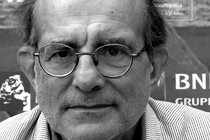Patria: 30 years of Italian history 60 metres high
- VENICE 2014: In Felice Farina’s new film, three workers go out onto a factory tower to protest against layoffs and commemorate thirty years of Italian history

After Return to Ithaca [+see also:
film review
trailer
interview: Laurent Cantet
film profile], in which episodes of recent Cuban history are recalled from a rooftop terrace overlooking the city, another film from this year’s Venice Days selection looks at the past from up high. Patria [+see also:
trailer
interview: Felice Farina
film profile] by Felice Farina steps onto a Turin factory tower together with three workers threatened with dismissal, and 60 metres high it retraces the last thirty years of Italian history, with no preconceptions or ideologies but, in an attempt to answer one simple question: how did we come to this?
When Salvo (Francesco Pannofino), a Sicilian labourer moved to the North, hears that the factory in which he works is shutting down he’s furious. Hastily he grabs some sandwiches and drinks from the vending machine and climbs on to the factory building’s tower, threatening to throw himself off. Giorgio (Roberto Citran), the factory’s union representative, meets him at the top of the tower to try to discourage him from jumping, but he ends up joining the protest himself. These two, opposites as far as their character and political beliefs go – Salvo’s a fascist, Giorgio an old communist – will be joined by Luca (Carlo Giuseppe Gabardini), the factory janitor, visually impaired, also known as a “compulsory employee” (employed in line with the law on the right to work for disabled persons).
The protest on the tower, pending the arrival of the TV cameras (“if il Gabibbo (famous Italian TV character) comes, something will happen”, Salvo is convinced), turns into an opportunity for the three to reflect and to discuss the Italy of recent decades: factory closures, Mafia killings, civil rights struggles, political corruption, that the director chooses to recall with original footage and recordings of the era rather than with words. The movie is based on the book by journalist Enrico Deaglio Patria 1978-2010: “I embarked on this enterprise desperate to produce 90 minutes of film from 900 pages of a book”, says Farina, “the only way of achieving this was to filter the words and to make room for the feelings, sounds and images that we all have in our memories”.
The editing, entrusted to the fantastic Esmeralda Calabria (editor, among many others, of Romanzo criminale [+see also:
film review
trailer
interview: Michele Placido
film profile], with which she won a David di Donatello, and director of Biùtiful cauntri), brings together the fragments of the archive material with the action taking place on the top of the tower, where the three protagonists, abandoned by everyone, will spend the whole night. It’s as if we can hear the characters speaking and immediately after we enter into their minds to see their memories, which are also collective memories. It’s a wonderful experiment, precious for those who were there and already know what happened, but especially for those – younger – who are curious and want to know where we’ve come from.
(Translated from Italian)
Did you enjoy reading this article? Please subscribe to our newsletter to receive more stories like this directly in your inbox.


















